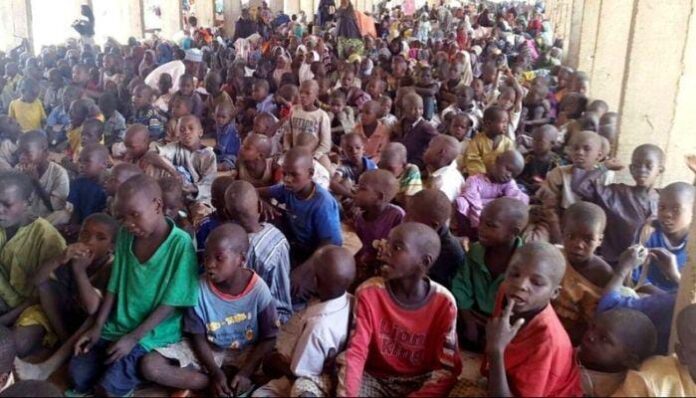Addressing the menace of Almajiri and out-of-school children, by Sonia Wa Sarki
I write to call the attention of the newly established National Almajiri Commission and other relevant agencies saddled with the responsibility of tackling the crisis of out-of-school children. The issue has lingered for too long and demands urgent, pragmatic action if Nigeria is to make meaningful progress in education and human development.
For decades, the North has struggled with the twin challenge of the Almajiri system and the rising number of children who are completely out of school. This has created a dangerous cycle of illiteracy, poverty, and social vices. Every street corner in many northern cities tells the same story: barefooted children, bowls in hand, begging for alms instead of sitting in classrooms.
According to UNICEF reports, Nigeria has the highest number of out-of-school children in the world, with over 10 million children excluded from basic education. A significant percentage of these children are from the northern part of the country. This reality is not only unfortunate but also a time bomb that threatens national security, peace, and development.
The Almajiri system, once rooted in noble intentions of imparting Islamic education, has today become synonymous with neglect, child labour, and poverty. Many parents, unable to cater for their children, send them off to distant towns under the care of teachers who lack the resources to provide proper welfare. The result is a generation of children abandoned to hunger, street begging, and exploitation.
READ ALSO: An open letter to Nigerian graduates, by Sonia Wa Sarki
The consequences of this neglect are glaring. Many of these children grow up without formal education, lacking the skills necessary to compete in today’s world. Worse still, they become easy recruits for criminal gangs, violent groups, and extremist movements. Nigeria cannot afford to ignore the dangerous implications of having millions of idle, uneducated, and hopeless youths roaming the streets.
The creation of the National Almajiri Commission is a welcome development, but it must not become another toothless bureaucracy. The commission must develop a clear strategy to integrate Quranic education with modern subjects such as English, Mathematics, Science, and vocational training. This will give the children both spiritual grounding and the practical skills needed to survive in today’s society.
Government at all levels must also invest massively in building functional schools across the North. The lack of infrastructure is one of the reasons many children remain out of school. Where schools exist, they are often overcrowded, understaffed, and poorly equipped. Education must be made accessible, attractive, and affordable for every child.
Equally important is the role of parents. Many parents deliberately withdraw children from school, either due to poverty, cultural beliefs, or ignorance. Sensitisation campaigns are necessary to change attitudes and emphasise the importance of education. No society can progress when its children are left behind.
READ ALSO: Revamp the Almajiri System to End Child Suffering’ – Social Advocate
Religious and traditional leaders must also rise to the occasion. For too long, the Almajiri menace has been treated with silence or indifference. Leaders who wield influence in communities must use their voices to advocate reforms, encourage enrolment in schools, and support initiatives aimed at ending child neglect.
Addressing this menace also requires economic empowerment. Poverty is at the root of the problem. Many families send their children to beg simply because they cannot provide food, clothing, and shelter. Empowering households with jobs, microloans, and skills training will reduce the burden and keep children in school.
Another critical step is the enforcement of child rights laws. Nigeria has the Universal Basic Education policy, but its implementation remains weak. States must enforce compulsory education and punish parents or guardians who neglect their children’s education. Without enforcement, policies remain mere paperwork.
Civil society organisations and international partners also have a role to play. Collaboration is key in building model schools, providing teacher training, and supporting child welfare. With proper synergy between government, NGOs, and communities, the tide can be turned.
READ ALSO: Is Almajiri an Islamic Ideology? A call for urgent reform, by Muhammad Ahmad Yaya Misau
The media must equally sustain the spotlight on this issue. The plight of the Almajiri and out-of-school children should not only make news during special events but remain a central theme in public discourse. Awareness is the first step towards action.
In conclusion, Nigeria cannot achieve sustainable development while millions of its children are excluded from education. The Almajiri crisis and the epidemic of out-of-school children must be treated as a national emergency. Education is the foundation of progress, and leaving children on the streets is nothing short of mortgaging the country’s future.
The time to act is now. The National Almajiri Commission and all stakeholders must rise above lip service and deliver real, tangible solutions. The future of the North—and indeed Nigeria—depends on it.
Sonia Wa Sarki is a student of Mass Communication at the Muhammadu Buhari University of Maiduguri (formerly University of Maiduguri), Borno State.
Follow the Neptune Prime channel on WhatsApp:
Do you have breaking news, interview request, opinion, suggestion, or want your event covered? Email us at neptuneprime2233@gmail.com






Sky is your starting point, no any weapon that is planned against you should prosper my Angel, my Queen continue y make us proud